For athletes, performance and recovery are inseparable pillars of success. As more individuals gravitate toward plant-based lifestyles, the demand for a structured, science-backed vegan athlete diet meal plan has grown substantially. While the idea of maximizing strength, endurance, and recovery on a meat-free diet may seem counterintuitive to some, research tells a different story. Carefully designed plant-based diets can offer all the nutrients, fuel, and regenerative support athletes need to thrive. This comprehensive guide explores how to craft a high-performance vegan athlete meal plan, grounded in evidence-based nutrition and optimized for recovery, endurance, and strength.
You may also like: Plant Based Diet vs Standard American Diet: What the Latest Studies Reveal About Long-Term Health Outcomes
The Science Behind a Plant-Based Diet for Athletes
A well-constructed plant-based diet for athletes can be nutritionally adequate—and even superior—in many respects when compared to omnivorous alternatives. Numerous studies have demonstrated that diets rich in whole plant foods contribute to reduced inflammation, enhanced blood flow, and improved cardiovascular health, all of which are critical for athletic performance. These benefits translate into faster recovery times, greater endurance, and improved metabolic efficiency.
The key lies in planning. Athletes who embrace a vegan lifestyle must strategically include high-quality protein sources, micronutrient-dense foods, and adequate calories to support the increased metabolic demands of training and recovery. With the right approach, a vegan athlete meal plan can provide optimal macronutrient distribution, sufficient antioxidants to combat exercise-induced oxidative stress, and bioavailable nutrients to support musculoskeletal integrity and immune function.
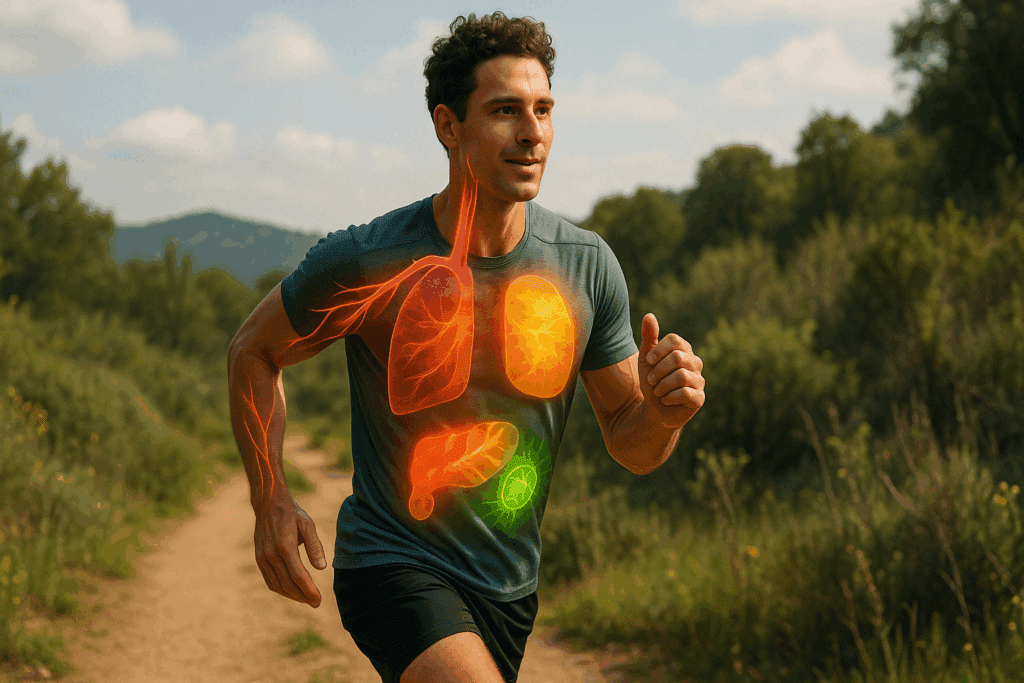
Energy Requirements and Caloric Density in Vegan Meal Planning
One of the primary considerations when designing a vegan athlete diet meal plan is caloric sufficiency. Plant-based foods are generally less calorie-dense than animal-based products. While this is advantageous for weight loss and metabolic health, it can be a challenge for athletes who need higher caloric intake to sustain intense training.
To meet these needs, athletes must prioritize nutrient-dense and calorie-rich plant foods such as nuts, seeds, legumes, whole grains, avocados, and dried fruits. Including multiple meals and snacks throughout the day can help distribute energy intake and maintain consistent blood sugar levels. Additionally, liquid calories from smoothies or plant-based protein shakes can play a strategic role in increasing calorie consumption without excessive fiber load that may impair digestion.
Protein Needs: Dispelling Myths and Optimizing Intake
Protein remains one of the most discussed nutrients in the context of plant-based athletic nutrition. Despite common misconceptions, a vegan athlete can meet—and exceed—their protein requirements through a diverse intake of legumes, tofu, tempeh, edamame, seitan, quinoa, whole grains, nuts, seeds, and high-quality vegan protein powders.
Research suggests that protein needs may be slightly elevated for plant-based athletes due to differences in amino acid profiles and digestibility. However, when meals are planned with variety and attention to leucine content—an essential amino acid critical for muscle protein synthesis—there is no disadvantage. A combination of grains and legumes, such as rice and beans or lentils with whole wheat pita, provides complementary amino acid profiles to form complete proteins.
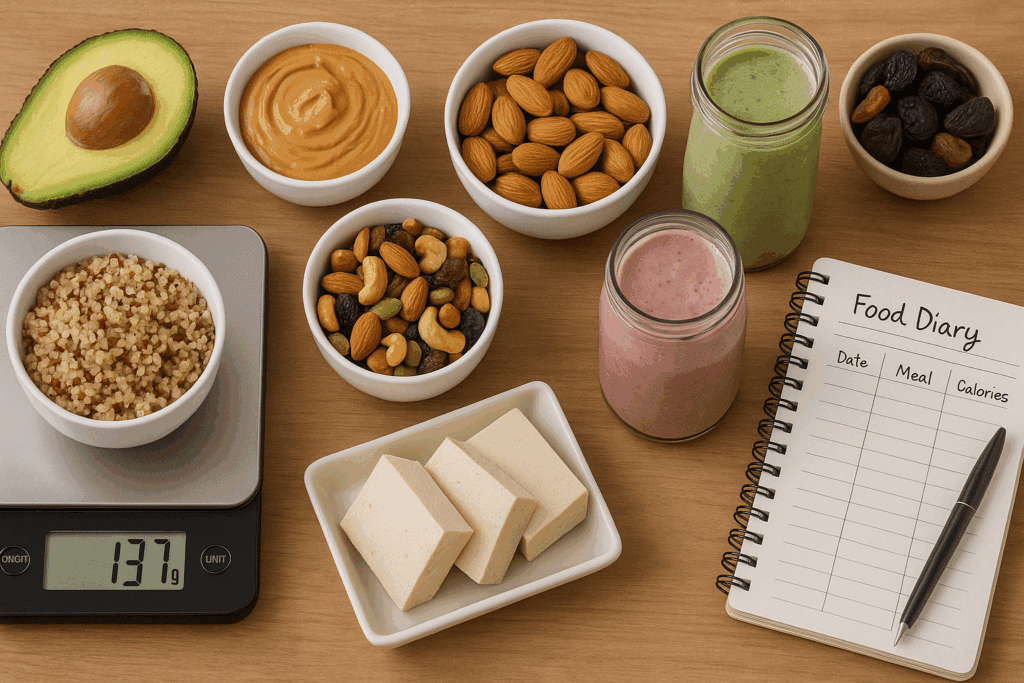
Balancing Macronutrients for Performance
Carbohydrates are the body’s preferred fuel source, particularly for high-intensity exercise. A plant-based diet for athletes naturally emphasizes complex carbohydrates from fruits, vegetables, whole grains, and legumes. These sources provide sustained energy, fiber, and micronutrients such as potassium and magnesium that support neuromuscular function.
Healthy fats also play a vital role in hormone production, cellular repair, and satiety. Plant-based sources of fats such as flaxseeds, chia seeds, walnuts, hemp seeds, and avocado deliver essential omega-3 fatty acids that combat inflammation and support cognitive function. Ensuring a balance among macronutrients while emphasizing nutrient density allows vegan athletes to perform at their peak and recover efficiently.
Micronutrient Considerations in a Vegan Athlete Meal Plan
While a vegan athlete diet meal plan can be nutrient-dense, certain micronutrients require intentional focus. Iron, zinc, calcium, vitamin D, iodine, and vitamin B12 are among the most crucial. These nutrients play direct roles in energy production, oxygen transport, bone health, immune resilience, and neurological function.
Iron from plant sources (non-heme iron) is less bioavailable than that from animal products. To enhance absorption, athletes should consume iron-rich foods like lentils, spinach, chickpeas, and fortified cereals alongside vitamin C-rich fruits and vegetables. Zinc is found in abundance in pumpkin seeds, cashews, and whole grains, while calcium can be sourced from fortified plant milks, tofu set with calcium sulfate, and dark leafy greens.
Vitamin B12 is not naturally found in plant foods and must be obtained from fortified foods or supplements. Similarly, vitamin D synthesis depends on sun exposure and geographic location, making supplementation advisable for many vegan athletes. Ensuring adequate intake of these micronutrients is essential to avoid deficiencies that could impair performance.
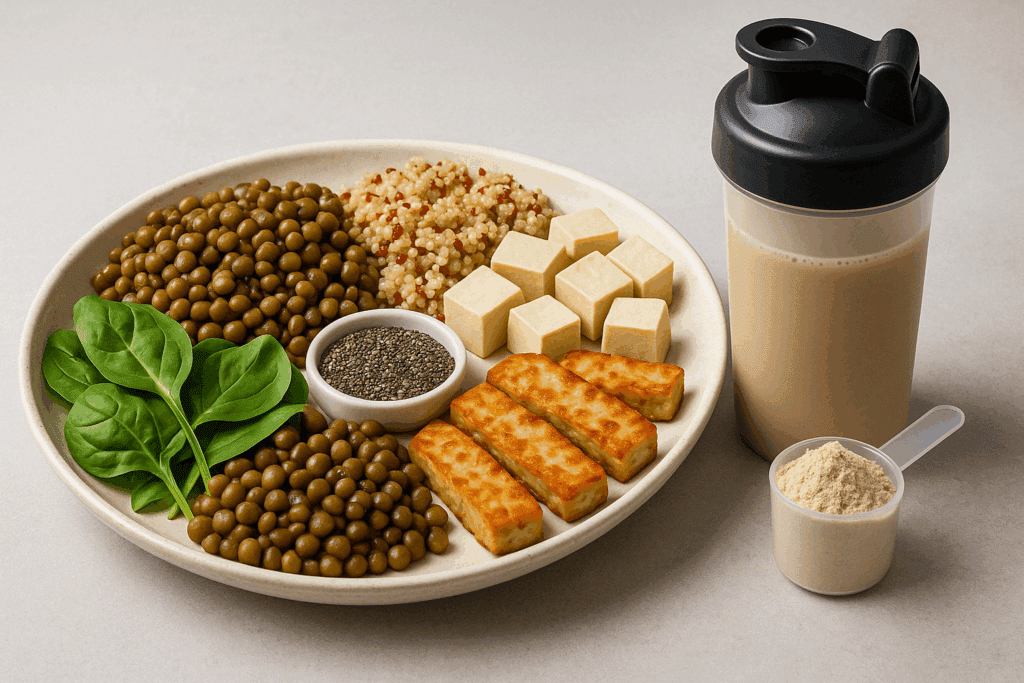
Hydration, Electrolytes, and Recovery Nutrition
Staying hydrated is vital for any athlete, but vegan athletes in particular benefit from foods naturally high in water content, such as fruits and vegetables. However, during prolonged training or competition, additional strategies are needed to replenish electrolytes and fluids. Coconut water, smoothies with a pinch of sea salt, and homemade electrolyte drinks can provide essential sodium, potassium, and magnesium.
Post-workout recovery nutrition should emphasize a balance of carbohydrates and protein to replenish glycogen stores and initiate muscle repair. A smoothie with banana, oat milk, pea protein, chia seeds, and frozen berries offers a powerful recovery option. Consuming recovery meals or snacks within 30 to 60 minutes post-exercise is ideal for optimizing nutrient uptake and enhancing regeneration.
Sample Day in a Vegan Athlete Meal Plan
A practical approach to applying this information involves visualizing a daily meal structure. For example:
- Breakfast: Overnight oats made with almond milk, chia seeds, blueberries, peanut butter, and a scoop of vegan protein powder.
- Mid-Morning Snack: Smoothie with banana, kale, flaxseeds, frozen mango, and hemp protein.
- Lunch: Quinoa and black bean salad with roasted sweet potato, avocado, red cabbage, lime-tahini dressing.
- Afternoon Snack: Trail mix with almonds, pumpkin seeds, dried apricots, and dark chocolate.
- Dinner: Lentil curry with brown rice, steamed broccoli, and a side of fermented kimchi for gut health.
- Evening Snack: Fortified plant-based yogurt with walnuts and cinnamon.
This framework ensures consistent energy, macronutrient balance, and micronutrient support across the day.
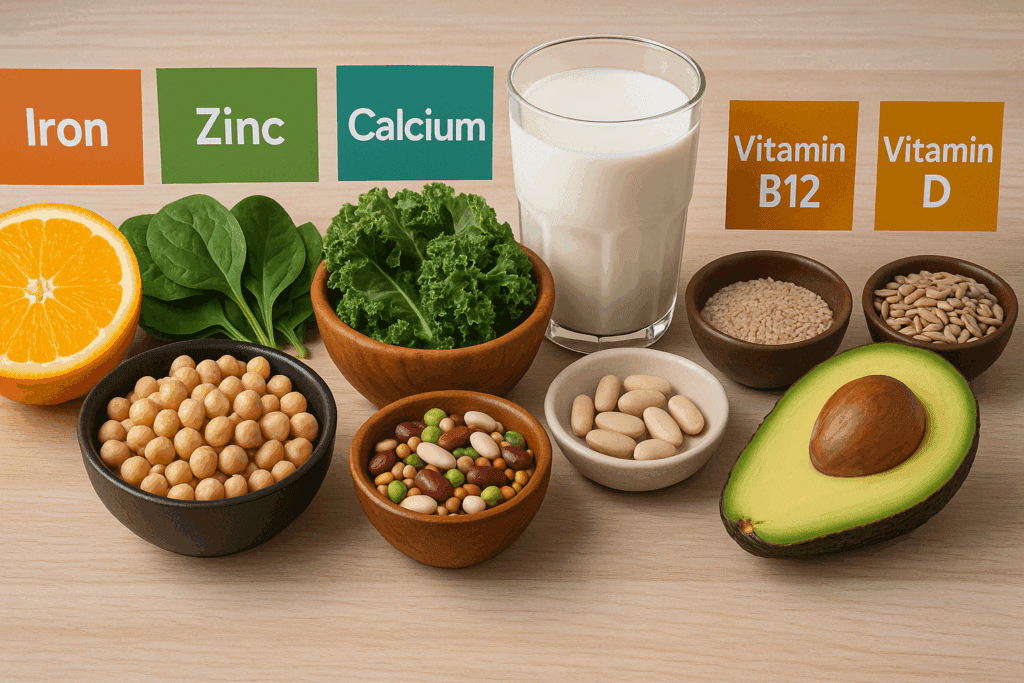
The Role of Supplements in a Vegan Athlete Diet
While a whole-foods approach should form the foundation of any plant-based diet for athletes, certain supplements can provide targeted support. In addition to vitamin B12 and vitamin D, omega-3 DHA/EPA from algae oil is recommended, especially for those who do not consume sufficient ALA from flaxseeds or chia.
Creatine is another ergogenic aid with significant research backing its benefits for strength, power, and recovery. As creatine is naturally absent in plant foods, vegan athletes may experience improved performance with supplementation. Additionally, beta-alanine and branched-chain amino acids (BCAAs) may offer benefits depending on the athlete’s training volume and intensity.
Vegan Diets vs. Low Carb and Keto: What’s the Difference for Athletes?
One recurring debate in sports nutrition involves comparing a plant-based diet with low-carb and ketogenic diets. While each dietary pattern has its proponents, it is important to evaluate how these approaches affect performance and sustainability.
The distinction between a ketogenic diet vs low carb approach often lies in the degree of carbohydrate restriction. A strict keto diet may limit carbohydrates to under 50 grams per day, whereas a low carb diet allows a broader range. In both cases, fat becomes the primary fuel source, which can compromise high-intensity exercise capacity due to reduced glycogen availability.
When comparing the low carb diet keto diet models to a high-carbohydrate vegan athlete meal plan, several critical factors emerge. Plant-based diets provide antioxidants, fiber, and phytochemicals that reduce inflammation and promote long-term cardiovascular health. In contrast, some keto-style plans—especially those heavy in animal fats—may raise concerns about long-term heart health.
Is keto a low carb diet? Yes, by definition. But is a keto diet sustainable for athletes? The answer depends on the sport. For endurance athletes who rely on glycogen stores, low-carb regimens may not support optimal performance. Is keto no carbs? Not exactly—it minimizes carbs but doesn’t eliminate them completely. The important takeaway is that a whole-food, carbohydrate-rich vegan diet aligns more closely with the physiological demands of most athletic disciplines.
Is Keto a Good Diet for Athletes?
Whether or not keto is a good diet for athletes depends on the context. For ultra-endurance athletes operating at low intensities, a fat-adapted state may offer some benefits. However, for athletes who require bursts of speed, strength, and recovery, the limitations of a keto or low-carb model become apparent.
There is also the question: is a keto diet sustainable over the long term? Research suggests that adherence to strict ketogenic protocols may be challenging due to limited food variety and potential nutrient deficiencies. In contrast, a balanced vegan athlete diet meal plan built on whole foods offers more dietary diversity, sustainability, and evidence-backed performance benefits. Athletes considering the ketogenic diet vs low carb strategies must weigh the trade-offs between fat adaptation and carbohydrate-fueled performance.
Real-World Applications: Vegan Athletes in Action
Elite vegan athletes continue to demonstrate that peak performance does not require animal products. Olympic weightlifter Kendrick Farris, ultramarathoner Scott Jurek, tennis star Venus Williams, and Formula One champion Lewis Hamilton all exemplify how a plant-based diet can fuel elite achievement.
What these athletes share is not only commitment to their craft but an understanding of nutritional nuance. Their vegan athlete meal plans are rich in complex carbohydrates, lean plant proteins, healthy fats, and targeted supplementation. Importantly, they view food not just as fuel, but as a tool for recovery, longevity, and ethical living.
Maximizing Performance Through Smart Meal Timing
Meal timing plays a pivotal role in the success of any athlete’s regimen. For plant-based athletes, distributing protein intake evenly across meals can help optimize muscle protein synthesis throughout the day. Consuming carbohydrates before and after training enhances energy availability and replenishment. Pre-workout meals should focus on easily digestible carbohydrates and moderate protein, while post-workout meals prioritize nutrient density and rehydration.
Nighttime meals and snacks can also support recovery. Foods rich in tryptophan, magnesium, and slow-digesting carbohydrates—such as oats with almond butter or tofu stir-fry with brown rice—may promote relaxation and muscle repair during sleep. A thoughtfully structured meal plan supports not just performance during the day but regeneration at night.
The Psychological Benefits of a Vegan Athlete Meal Plan
Athletes who follow a plant-based lifestyle often report psychological benefits alongside physical ones. Reduced inflammation and improved sleep quality can enhance mood and mental clarity. Additionally, the ethical alignment of food choices with personal values may foster a deeper sense of purpose, motivation, and consistency in training.
There is also a growing body of research suggesting that gut health, profoundly influenced by a fiber-rich plant-based diet, is closely linked to mental well-being. The connection between the gut-brain axis, athletic stress management, and emotional resilience is gaining recognition as a crucial aspect of sports performance.
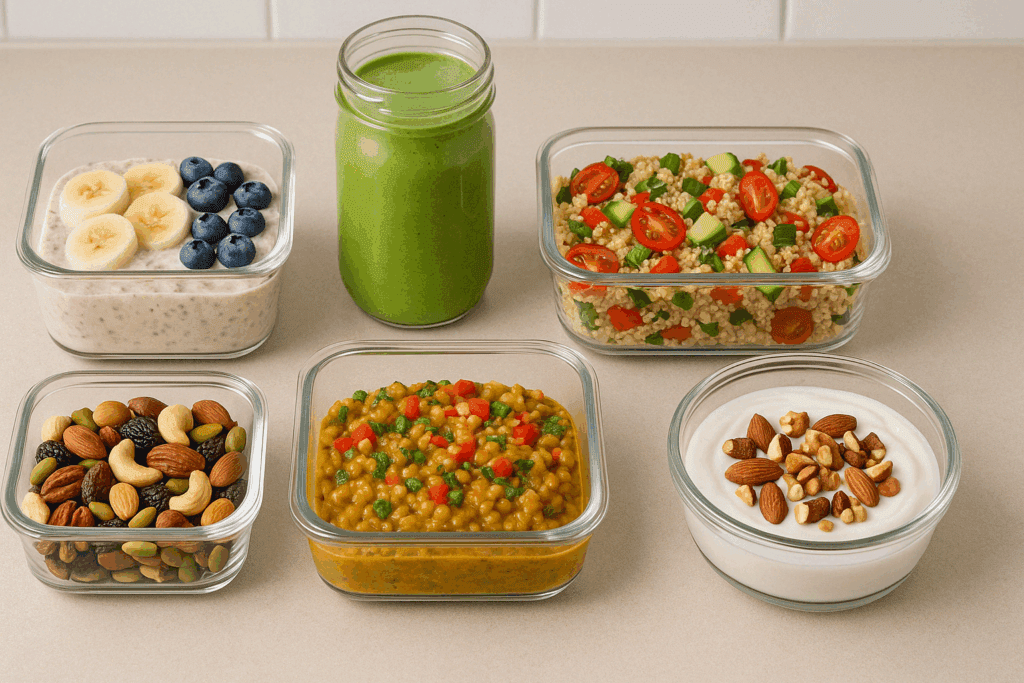
Frequently Asked Questions: Vegan Athlete Diet Meal Plan and Vegetarian Lifestyles
1. How can a true vegetarian athlete ensure optimal recovery without animal-based protein?
A true vegetarian athlete can support recovery by focusing on nutrient synergy and smart foodpairing. Combining legumes and whole grains—such as lentils with brown rice or hummus with whole wheat pita—ensures complete protein intake. Beyond protein, true vegetarians benefit from antioxidants in berries, polyphenols in dark leafy greens, and adaptogenic herbs like ashwagandha, which support the body’s stress response. While protein quantity matters, the timing and quality of plant-based meals play an equally vital role in regeneration. For those adhering strictly to a true vegetarian lifestyle, fortified foods and supplements (like vitamin B12 and creatine) are crucial recovery aids.
2. What are the different forms of vegetarian that might align with athletic goals?
Athletes may choose among different forms of vegetarianism based on ethical preferences, tolerance,and performance goals. Lacto-ovo vegetarians consume dairy and eggs, which can simplify meeting protein and vitamin B12 needs. Pescatarians include fish, providing direct access to omega-3s, while flexitarians adopt a mostly plant-based approach with occasional animal products. Each of these different forms of vegetarian offers varying degrees of flexibility, making them adaptable to different training intensities and nutritional needs. The key is to match the category of vegetarian with both lifestyle sustainability and physiological demand.
3. Why are people vegetarian even when pursuing intense fitness or sports performance?
Contrary to outdated assumptions, many elite athletes choose vegetarianism for reasons beyondethics. Environmental sustainability, improved digestion, faster recovery, and reduced inflammation are common motivations. When you define vegetarianism not just as abstaining from meat but as embracing plant-forward wellness, the choice becomes performance-enhancing. Among the different vegetarian types, some prefer minimalism and simplicity in food choices, which can reduce cognitive fatigue around meal planning. In addition, a growing body of research connects plant-based diets with better heart health, a key asset in endurance sports.
4. How do different kinds of vegetarians handle micronutrient challenges like B12 and iron?
Different vegetarians approach micronutrient supplementation based on their chosen dietary pattern.For example, lacto-ovo vegetarians may get B12 from eggs and dairy, whereas vegans rely on fortified foods or supplements. Iron is more abundant in legumes and dark greens but is less bioavailable than animal-sourced iron. Therefore, pairing these foods with vitamin C-rich options, such as bell peppers or citrus fruits, enhances absorption. Understanding different levels of vegetarianism helps tailor these strategies to individual nutrient gaps.
5. Are there psychological advantages tied to being a true vegetarian athlete?
Absolutely. Some research and anecdotal reports suggest that adopting a true vegetarian lifestyle canimprove mental clarity, emotional regulation, and stress recovery. This may be partially due to the high intake of fiber, prebiotics, and phytochemicals, which influence the gut-brain axis. Additionally, knowing one’s dietary choices align with ethical or environmental values can enhance mental resilience, especially under training pressure. These psychological perks may differ across various types of vegetarians depending on dietary strictness and food quality. The broader impact of defining vegetarianism includes how it shapes self-identity and motivation.
6. How do different forms of vegetarianism adapt to changing training phases?
Training periods differ—off-season, pre-competition, peak intensity—and each phase demands specifidietary adjustments. Different forms of vegetarianism offer versatility during these shifts. For example, during off-season strength training, adding calorie-dense plant-based meals such as nut butters and legumes can help build mass. In contrast, during endurance-heavy periods, high-carb vegetarian meals with grains and fruit provide essential glycogen support. Recognizing the flexibility within different forms of vegetarian allows athletes to periodize nutrition without compromising dietary ethics.
7. Can various types of vegetarians build muscle as effectively as omnivores?
Yes, with strategic planning. Different vegetarians can absolutely develop muscle mass by focusing onleucine-rich plant proteins like soy, pea, and lentils. Muscle-building success depends on consuming enough total calories, distributing protein evenly throughout the day, and using resistance training to stimulate growth. Supplementing with creatine, especially in stricter forms of vegetarianism like veganism, can further enhance muscle gain. With dedication and proper nutrient timing, the gap between omnivores and different vegetarian types in strength training outcomes is negligible.
8. What social or cultural challenges do athletes face across different levels of vegetarianism?
Navigating social norms can be challenging, especially for athletes traveling to regions wherevegetarian options are limited or misunderstood. Different levels of vegetarianism may influence how easily one adapts—flexitarians often find it easier than a true vegetarian. Athletes may also encounter skepticism about plant-based diets within traditional sports communities. However, increased public interest in plant-based performance is shifting perceptions. As society becomes more familiar with the various types of vegetarians, the cultural friction continues to diminish, especially at the elite level.
9. How does one choose the right category of vegetarian for their athletic lifestyle?
Choosing the ideal category of vegetarian depends on multiple factors: personal values, healthhistory, metabolic demands, and training load. Someone with iron absorption issues might benefit from a lacto-vegetarian approach that includes dairy to enhance meal diversity. Athletes in weight-class sports might opt for lighter plant-based meals aligned with different levels of vegetarianism to maintain optimal weight. Exploring the full spectrum of different vegetarian types allows for customization based on biofeedback, goals, and food access. An individualized approach yields the best results, especially for long-term sustainability.
10. What innovations are emerging in the world of vegetarian sports nutrition?
Emerging technologies are revolutionizing how different forms of vegetarian athletes meet theirnutritional goals. Precision supplementation through wearable nutrient trackers, plant-based protein fermentation, and AI-driven meal planning apps are changing the game. These tools can support different kinds of vegetarians in optimizing nutrient timing, particularly for rare micronutrients like zinc or iodine. Even new plant-based performance supplements, such as vegan-friendly collagen alternatives and adaptogenic drink blends, cater to niche athletic needs. As the category of vegetarian broadens, so too does the innovation in plant-based performance fueling.
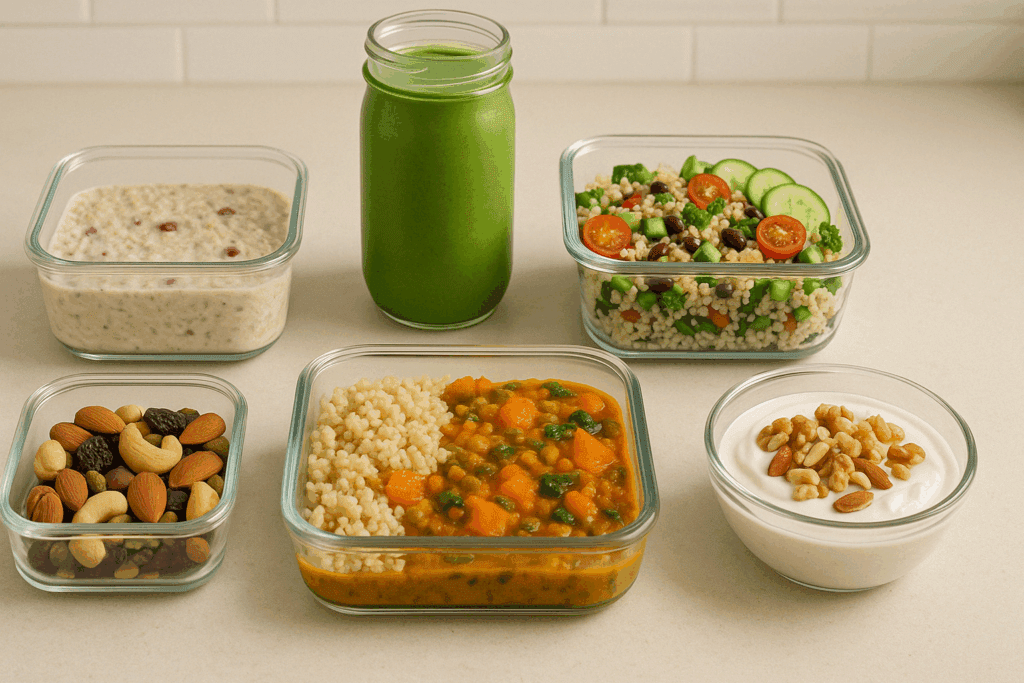
Conclusion: Why a Vegan Athlete Diet Meal Plan Supports Long-Term Peak Performance
A well-structured vegan athlete diet meal plan offers more than just an alternative to traditional sports nutrition—it provides a comprehensive, sustainable, and evidence-based strategy for optimizing performance, health, and recovery. By focusing on whole-food plant-based nutrition, athletes gain access to a wide array of micronutrients, antioxidants, and anti-inflammatory compounds that support both short-term output and long-term resilience.
Unlike some restrictive dietary models such as the keto diet vs low carb approaches, a plant-based plan supports high-intensity activity, muscle recovery, and metabolic efficiency without sacrificing variety or flavor. And while debates like “is keto a low carb diet” or “is a keto diet sustainable” may continue, the science behind plant-based athletic nutrition speaks volumes.
Ultimately, a vegan athlete meal plan is not about limitation but optimization. It aligns ethical considerations with peak physical performance, allowing athletes to thrive in competition, recover with precision, and fuel their goals with every bite.
Was this article helpful? Don’t let it stop with you. Share it right now with someone who needs to see it—whether it’s a friend, a colleague, or your whole network. And if staying ahead on this topic matters to you, subscribe to this publication for the most up-to-date information. You’ll get the latest insights delivered straight to you—no searching, no missing out.
Further Reading
Plant-Based Power: A Guide for Vegan Athletes
VEGETARIAN AND VEGAN DIETS FOR ATHLETIC TRAINING AND PERFORMANCE
Sorry, this store is currently unavailable.
Disclaimer
The information contained in this article is provided for general informational purposes only and is not intended to serve as medical, legal, or professional advice. While NewsHealthWatch strives to present accurate, up-to-date, and reliable content, no warranty or guarantee, expressed or implied, is made regarding the completeness, accuracy, or adequacy of the information provided. Readers are strongly advised to seek the guidance of a qualified healthcare provider or other relevant professionals before acting on any information contained in this article. NewsHealthWatch, its authors, editors, and contributors expressly disclaim any liability for any damages, losses, or consequences arising directly or indirectly from the use, interpretation, or reliance on any information presented herein. The views and opinions expressed in this article are those of the author(s) and do not necessarily reflect the official policies or positions of NewsHealthWatch.

